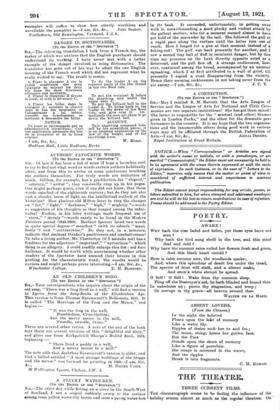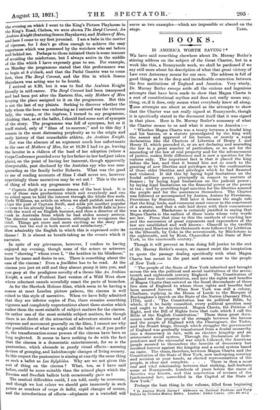TILE THEATRE.
THREE CURRENT FILMS.
THE cinematograph seems to be feeling the influence of the holiday season almost as much as the regular. theatres. On
the evening on. which I went to the King's Picture Playhouse in
the King's Road, Chelsea, we were shown The Beryl Coronet, An Arabian Knight (featuring Sessue Hayakawa), and Mothers of Men,
and here I come to my first jeremiad- I am a babe in the matter
of cinemas, for I don't go often enough to achieve the easy expehness which was possessed by the watchers who sat before and behind me. Perhaps to those initiated there is some manner
of avoiding the misfortune, but I always arrive in the middle of the film which I have expressly gone to see. For example, on Monday the programme stated that this performance was to begin at 8 o'clock, and that the Pathb Gazette was to come first, then The Beryl Coronet, and the film in which Sessue Hayakawa was acting was to be fourth. I arrived at 8.20, but it was to find the Arabian Knight literally in mid-career. The Beryl Coronet had been transposed
and had been put after the Eastern film, only Mothers of Men keeping the place assigned to it on the programme. But this
is not the last of my plaints. Seeking to discover whether the lady whom the hero was embracing as I entered was the virtuous lady, the vamp., or the ingenue, I turned to my programme, thinking that, as at the ballet, I should find some sort of synopsis of the story. The programme was full of synopses, but as it itself stated, only of " films of to-morrow," and to this day I remain in the most distressing perplexity as to the origin and early history of that remarkable athlete, An Arabian Knight.
Nor was the absence of an argument much less unfortunate in the case of Mothers of Men, for at 10.30 I had to go, leaving the heroine in a chdleau of the land of her adoption (where a Corps Conference presided over by her father-in-law had just taken place), on the point of having her innocent, though apparently disreputable, past disclosed by the Austrian spy who was mas- querading as the family butler Roberts. What was the good to me of reading accounts of films I shall never see, however appetizingly these narratives may be set out This is the sort of thing of which my programme was full:
" Captain Swift is a romantic drama of the best kind. It is one of those rare productions which suit everybody and can be relied upon to hold the interest through the whole five reels. Earle Williams, an article on whom we shall publish next week, plays the part of Captain Swift, and adds yet another popular snacess to his already long list. . . . Captain Swift falls in love with the ward of an English baronet, and then a director of the Lank in Australia from which he had stolen money arrives. The director makes no disclosures, although he recognizes the thief. Things get more and more exciting as the story pro- gresses, but the end is both novel and satisfactory."
How admirably the English in which this is expressed suits its
theme ! It, is almost as breath-taking as the events which it narrates.
In spite of my grievances, however, I confess to having enjoyed my evening, though none of the actors or actresses were " showing " whom even I, " the heathen in his blindness," know by name and desire to see. There is something about the case of the cinema! Even a jeuilleton has to be read. At the cinema you just sit still and they almost pump it into you, and you gasp at the prodigious novelty of a theme like An Arabian Knight, a sort of Furthest East version of a Wild West show where reluctant camels scornfully enact the parts of broaches. As for the Sherlock Holmes films, which seem to be having a season at most London picture palaces, the cinema is well suited to this style of narrative. When we have fully admitted that they are inferior copies of Poe, there remains something vigorous and completely unpretentious about these stories which makes them the most suitable of subject matters for the cinema.
Or rather one of the most suitable subject matters, for though there is no doubt of the attraction of adventure stories and of suspense and movement generally on the films, I cannot see why the possibilities of what we might call the ballet or, if you prefer it, the transformation-scene powers of the cinema have been so long neglected. It seems to have nothing to do with the fact that the cinema is a democratic entertainment, for so is the pantomime, which abounds in purely visual effects—amusing devices of grouping, and kaleidoscopic changes of living scenery. In this respect the pantomime is aiming at exactly the same thing as such a ballet as Les Sylphides. Why are we not given this
sort of thing on the cinema ? What, too, as I have said before, could be more suitable than the mimed plays which the
Russian and Swedish ballets both occasionally gave us The musical difficulties could, I am told, easily be overcome, and though we lost colour we should gain immensely in such points as numbers of corps de ballet, rapid changes of scenes, and the introductions of effects—elephants or a waterfall will serve as two examples—which are impossible or absurd on the



































 Previous page
Previous page